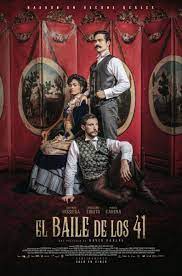
EL BAILE DE LOS 41/ DANCE OF THE 41
Mexico, 2020, 98 minutes, Colour.
Alfonso Herrera, Emiliano Zurita, Mabel Cadena, Fernando Becerril.
Directed by David Pablos.
This is a Mexican film with a setting at the beginning of the 20th century, the transition from 19th-century society, a commentary on public morals and private morals.
The strong theme is that of homosexuality, the prevalence of homosexuals and gay activity amongst the upper classes, some detailed presentation of their private and secret lives, up to the ball of the title. It is also the story of closeted men, homophobia, and public attack on homosexuals.
At the centre of the film is a government official, Ignacio, married but not relating well with his native Mexican wife, her desire to have a child. He goes through the formalities of marriage, public appearance of the happy marriage. However, he belongs to a group of homosexuals who gather secretly, enjoy each other’s company, cultivate relationships.
There is a crisis in the film when Ignacio meets a young man and begins a relationship with him, bringing him to the club, his initiation, and the leading up to the traditional more of the 41 members of the club. However, it is rated, the men arrested, publicly humiliated. However, Ignacio is able to survive and there is a cover-up about his belonging.
Strong atmosphere, sets and decor, and invite into a secret world of the gay club.
- A Mexican story? Based on a true story? The turn of the 20th century? Mexican society? Politics? Homosexuality and society?
- The settings, the city, mansions and affluence, political buildings and offices, the men’s club, riding in the countryside? The musical score?
- The impact of the story at the time, homosexuality and the law, public opinion and condemnation, homophobia, the revelation of the club, the press, public denunciation, imprisonment?
- The focus on Ignacio, his place in society, in government and Congress, influence, ambitions, manipulating moves against politicians, discussions with the President, the President testing him out? The opening, the social gathering, the discussions with the President, Amada as his fiancee, the wedding ceremony? His secret life, double standards, hypocritical, treatment of his wife?
- The wedding night, his reluctance with his wife, fierce behaviour? The aftermath, the difficulty of doing his duty? His staying out late for work, for the club? Arriving late, the effect on Amada? Her concern and sending out the police? His morning arrival, dismissing the police?
- Amada, engagement, her background, Indian background, daughter of the President? The gathering of ladies, her half-sister, Luz? The continued clashes? The effect of Ignacio’s treatment? Lonely, the collapse, illness? Wanting a child? Ignacio and the separate room? Her appearing in public, hosting the dinner with her parents? The toll on her? Searching Ignacio’s desk, finding Evaristo’s letters? Her reaction, her hold over Ignacio, the threat with her skill with the gun, up the tree, firing?
- Ignacio, in the building, the encounter with Evaristo, the attraction, the drink, the beginning of the relationship? The effect on Ignacio, a loving experience, comparison with Amada? His inviting Evaristo to the club? Don Felipe, the veteran, the joking manner? Ignacio member of the club since he was 18?
- Evaristo, the arrival at the club, the ritual, blindfold, the promises, the welcome? The 41 members of the club? The range of ages, veterans, politicians? The cross-dressers? The company, the dinner, the orgy, the gatherings, the background of Carmen, the song from the Magic Flute, the vaudeville performances, the applause? The preparation for the annual Ball?
- The political background, the role of the president? Ignacio and his manoeuvres? The pressure on him, no prospect of success, his withdrawing? And the possibility of leaving the country with Evaristo?
- The buildup to the ball, the men gathering, half dressed as women, dresses and make up? The dancing? The police outside, the raid, hurting the men, in a circle, taking them out, in the street, exposed, the public ridicule, shame, exposure and violence?
- The president, his son-in-law being removed from the prison? Evaristo going to Yucatan, the news of his death?
- Ignacio, the formalities of the marriage, his political life, the cover up?
- Ignacio as an unsympathetic character, audiences and identifying with him on not, his situation? Identifying with Amada? Sympathy for her situation? Her strong character within the social confines of the time and Mexico? A film of 2020, exposure of homophobia?